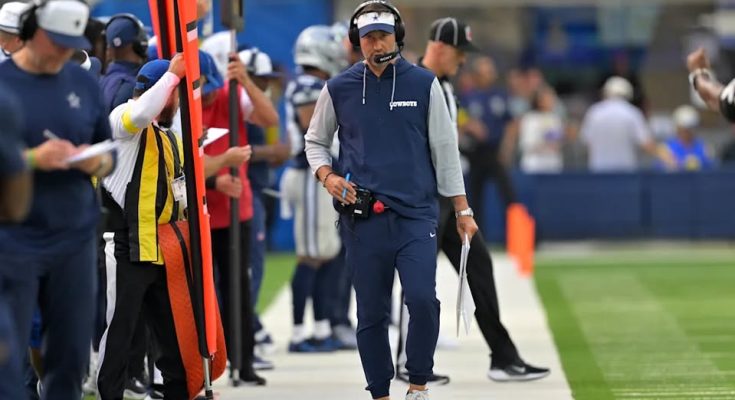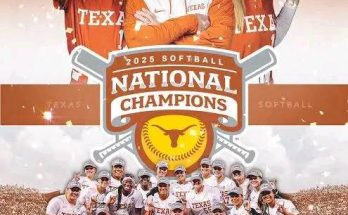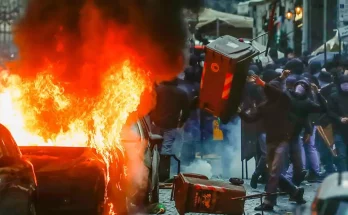The Dallas Cowboys, often referred to as “America’s Team,” have long been one of the most recognizable and polarizing franchises in the NFL. With a storied history, a massive fanbase, and sky-high expectations, every move the organization makes is scrutinized under an intense spotlight. Recently, the Cowboys’ coaching staff was ranked dead last in NFL future rankings, a damning indictment that has sparked debate among analysts, fans, and critics alike. This ranking raises serious questions about the direction of the franchise, the competency of its leadership, and whether the team can realistically compete for a championship in the near future.
At the heart of the issue is head coach Mike McCarthy, who was hired in 2020 after a successful tenure with the Green Bay Packers that included a Super Bowl victory. However, McCarthy’s time in Dallas has been marked by inconsistency, questionable decision-making, and a lack of playoff success. Despite inheriting a roster loaded with offensive talent—including Dak Prescott, CeeDee Lamb, and a dominant offensive line—McCarthy has failed to deliver deep postseason runs. The Cowboys have won the NFC East in two of his four seasons but have only managed one playoff victory during that span. In a league where coaching can be the difference between contention and mediocrity, McCarthy’s shortcomings have become increasingly difficult to ignore.
The criticism doesn’t stop with McCarthy. The Cowboys’ coaching staff as a whole has been labeled as underwhelming, lacking innovation, and unable to maximize the talent on the roster. Offensive coordinator Brian Schottenheimer, who took over in 2023 after Kellen Moore’s departure, has been criticized for his predictable play-calling and inability to adapt in crucial moments. The offense, which should be one of the most explosive in the league given its personnel, has often looked stagnant, particularly in high-pressure situations. Defensive coordinator Dan Quinn, who was initially praised for revitalizing the Cowboys’ defense, has also faced scrutiny for his unit’s inability to step up in key games. While Quinn’s defenses have been statistically strong in the regular season, they have frequently collapsed when it matters most, as seen in the team’s embarrassing playoff loss to the Green Bay Packers in the 2023 season.
Beyond the coordinators, the Cowboys’ assistant coaching staff has also been questioned. From positional coaches to special teams coordinators, there is a growing sentiment that Dallas lacks the depth of high-quality coaching that other top-tier teams possess. In a league where the margins between winning and losing are razor-thin, having a staff that can develop players, make in-game adjustments, and out-scheme opponents is crucial. The Cowboys, at least according to these rankings, do not have that.
Another factor contributing to the low ranking is the perceived lack of a long-term vision. Jerry Jones, the team’s owner and general manager, is known for his hands-on approach and impulsive decision-making. While his passion for winning is undeniable, his tendency to prioritize short-term fixes over sustainable team-building has often backfired. The Cowboys have repeatedly relied on big-name acquisitions and flashy moves rather than cultivating a cohesive, well-rounded roster. This approach has left the team with glaring weaknesses in key areas, particularly along the offensive line and in the defensive secondary, which have not been adequately addressed in recent drafts or free agency.
The future rankings also take into account the potential for growth and adaptability, areas where the Cowboys’ coaching staff falls short. In today’s NFL, successful teams are those that evolve, embrace analytics, and innovate schematically. The best coaches—such as Andy Reid, Kyle Shanahan, and Sean McVay—are constantly tweaking their systems to stay ahead of the competition. By contrast, the Cowboys’ staff has often appeared stubborn, sticking to outdated philosophies even when they prove ineffective. This rigidity has made the team predictable and easier to game-plan against, particularly in high-stakes matchups.
Player development is another critical aspect where the Cowboys’ coaching staff has struggled. While the team has drafted well in some areas—finding stars like Micah Parsons and Trevon Diggs—there have been too many instances of highly-touted prospects failing to reach their potential under Dallas’ guidance. Whether due to poor coaching, mismanagement, or a lack of proper development programs, the Cowboys have not consistently turned raw talent into reliable contributors. This is a stark contrast to teams like the San Francisco 49ers or Philadelphia Eagles, who have built deep, talented rosters by maximizing the abilities of both stars and role players alike.
Perhaps the most concerning aspect of the Cowboys’ coaching situation is the apparent disconnect between the staff and the players. Multiple reports have suggested frustration within the locker room over game plans, preparation, and in-game decision-making. When players publicly question play-calling or express confusion over schemes, it reflects poorly on the coaching staff’s ability to lead and inspire confidence. A team with Super Bowl aspirations cannot afford to have its leaders doubted by those they are supposed to guide.
Of course, it’s not all doom and gloom for the Cowboys. The roster still boasts elite talent, and with the right adjustments, they could quickly re-emerge as legitimate contenders. However, the current coaching staff’s ranking at the bottom of the NFL’s future rankings suggests that major changes may be necessary. Whether that means moving on from McCarthy, overhauling the assistant coaches, or reevaluating the front office’s approach, the Cowboys cannot afford to stand pat if they hope to break their nearly three-decade-long Super Bowl drought.
In the end, rankings like these are subjective, and the NFL is a league where fortunes can change rapidly. But the concerns surrounding the Cowboys’ coaching staff are real and warranted. Until they prove they can elevate the team when it matters most, skepticism will continue to follow them. For a franchise with the resources, fanbase, and history of the Dallas Cowboys, being ranked last in anything is unacceptable. The pressure is on—now they must respond.



